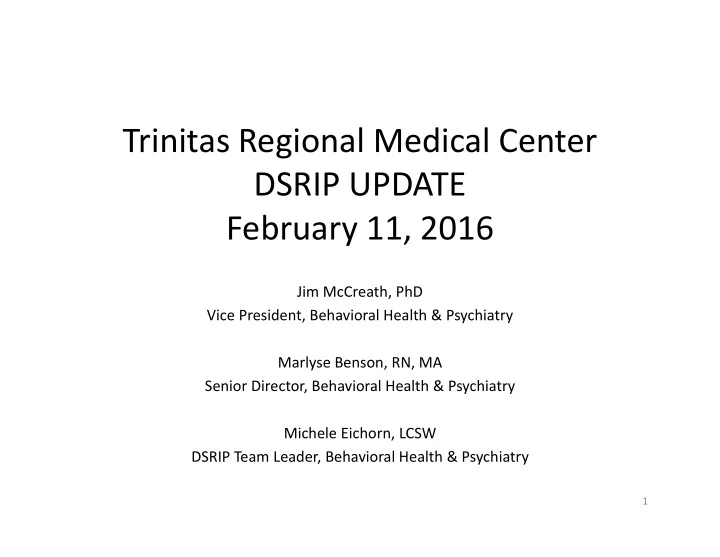

Trinitas Regional Medical Center DSRIP UPDATE February 11, 2016 Jim McCreath, PhD Vice President, Behavioral Health & Psychiatry Marlyse Benson, RN, MA Senior Director, Behavioral Health & Psychiatry Michele Eichorn, LCSW DSRIP Team Leader, Behavioral Health & Psychiatry 1
Program Description Hospital-wide Screening for Substance Use Disorders • Algorithm driven treatment for alcohol withdrawal • Screening of all admissions • Identified patients receive evidenced ‐ based approach: Screening, Brief Intervention & Referral to Treatment (SBIRT) Depression screening (PHQ ‐ 9) provided to target patients • • Patients agreeable to substance abuse services are linked, by an Addiction Specialist, to outpatient treatment programs and other concrete services (housing, welfare benefits, primary care physicians) 2
Outcomes • Comparison of Attributed and non ‐ attributed Screenings • IT detailed metric summary helps to identify “missed” audits – By unit – Nursing survey through Survey Monkey – Nursing Focus Groups • Stage 4 metrics collected through existing EMR with modifications. Reduction in restraint episodes and hours in restraints • • High Risk Patient satisfaction re: screening process implemented ‐‐ 30 patients per month by patient advocate ‐‐ Has resulted in Addictions Specialist Staffing changes 3
Outcomes • Comparison of Attributed and non ‐ Attributed Screenings for October – December 2015 % of AUDITS # Not Done, # of Completed Completed / Total Missing or Month AUDITS In ‐ Patient admits Refused October 942 90.7 19 November 831 90 20 December 893 87.5 23 Attrib Popl % of Attrib Popl # AUDITS Completed / Not Done, Attrib Popl # of Total In ‐ Patient Missing or Month Completed AUDITS admits Refused October 144 94 3 November 137 93.8 5 December 148 91.4 3 4
Restraint Data 94 84 74 64 54 44 34 24 13 ‐ Q1 13 ‐ Q2 13 ‐ Q3 14 ‐ Q1 14 ‐ Q2 14 ‐ Q3 14 ‐ Q4 15 ‐ Q1 15 ‐ Q2 ICU (Hours/Patient) Med/Surg (Hours/Patient) 72 Hours 48 Hours 5
Partners Initial Project Partners (2014) • Prevention Links • New Hope • Turning Point • Flynn House Proceed • • Streetlight Mission Added in 2015 • Salvation Army • YMCA—Gateway Integrity House • • CURA • Crystal Lake • Second Home Adult Medical Day Care • Cranford Park Rehab & Health Center • Bayway Family Success Center HomeFirst Interfaith Housing & Family Services • • Elizabeth Nursing & Rehab Center In progress: Mental Health Association of New Jersey (MHANJ) 6
Partner Statistics A core group of project partners ‐‐‐ four organizations ‐‐ receive the majority of treatment referrals (about 70%). Gateway Family YMCA in Elizabeth, NJ ‐ Partnership between the YMCA and Trinitas, Project Sustain, is a residentially ‐ assisted, substance abuse housing program for pregnant and/or parenting women. Women retain custody of their children while in treatment. ‐ Housing services for adult men and women Flynn House –sober living facility for adult men in Elizabeth, NJ ‐ The Flynn House is a 28 bed facility that mandates all patients be in substance abuse treatment and to adhere to strict program guidelines. Strong emphasis is placed on developing long ‐ term, independent living skills. Salvation Army, Elizabeth, NJ ‐ Emergency Shelter For men and women (open 24 hours a day, 7 days a week). Proceed—Spanish speaking SAS treatment facility ‐‐ Substance Abuse treatment for Spanish speaking patients. 7
New Partner Highlight: Innovative Model Providing Peer ‐ Support at the Bedside Mental Health Association of New Jersey (MHANJ) Unique, one of a kind partnership, between MHANJ and a Medical Center MHANJ trains peer workers in recovery for substance abuse and mental health issues to provide support and case ‐ management services to patients. Targeted patients are identified by the Addiction Specialist or Medical Social Workers with the goal of two ‐ person, peer teams providing bedside support, discharge planning help and post ‐ discharge assistance such as transportation to appointments and in ‐ home support. 8
Partners: Strengths • Four core partners provide: • Rapid response time • Housing within hours of being informed of a patient’s discharge • Effective communication regarding patient’s status • Compliance with DSRIP requirements for PHQ ‐ 9 & Patient Satisfaction Surveys • Willingness to participate in periodic roundtable discussions 9
Partners: Challenges • One partner, residential provider, requested payment for staff time to complete the PHQ ‐ 9 and the patient satisfaction survey . Affiliation Agreement was not renewed. Agencies who provide services, but who do not generate Medicaid bills (grant run facilities). • Examples include St. Bridget’s in Newark, NJ. ‐‐ St. Bridget's is a transitional and emergency shelter residence that provides housing and supportive services to homeless men living with HIV/AIDS. St. Bridget's employs a Certified Addiction Dependency Counselor (CADC) who provides addiction treatment to the clients. However, this program does not generate Medicaid bills, so would not meet the standards NJ DSRIP billing & coding requirements. Partners with strict abstinence ‐ only treatment philosophies. This mean, if a patient relapses, • they can automatically be discharged from a program or have housing privileges revoked. 10
Partners: Engagement Strategies Strategy #1: Round Table Discussions & Celebrations. One example: Thanksgiving Celebration & Partner Awards Ceremony on 11/19/15. Strategy #2: DSRIP Symposium “How Addiction Affects our Communities: A Model for Healthcare Integration” on May 20, 2016. 11
Community Partners—Gaps in Service • Harm Reduction Model for treatment & housing • Lack of evening programs for patients utilizing Medicaid & Charity Care • Limited detox programs • Medically focused transitional housing • Lack of easily accessible primary care services 12
Recommend
More recommend